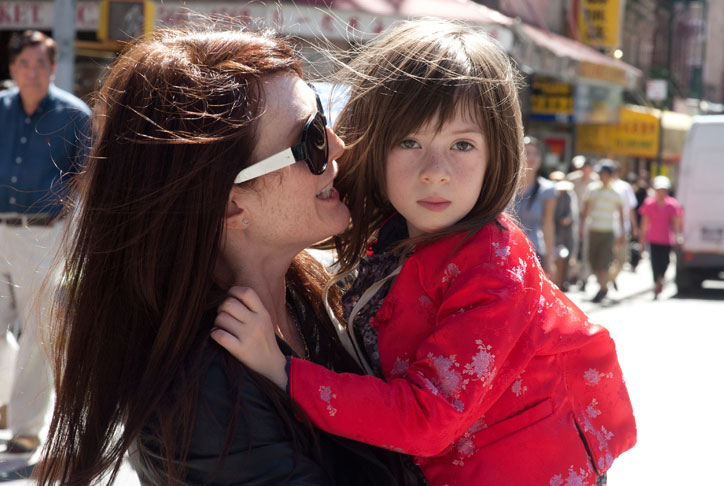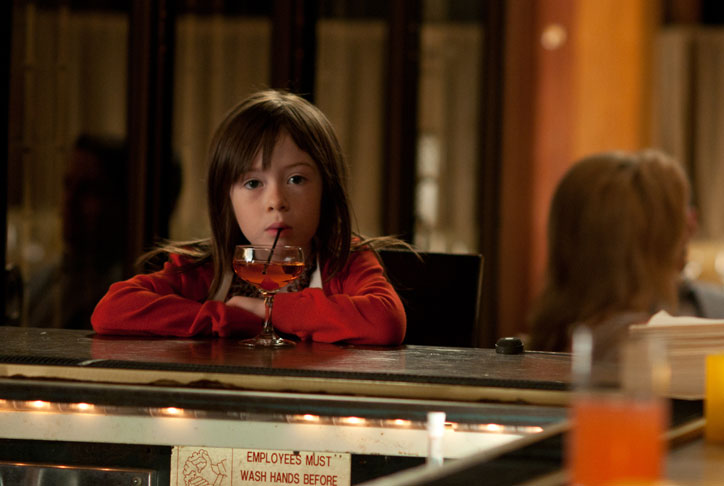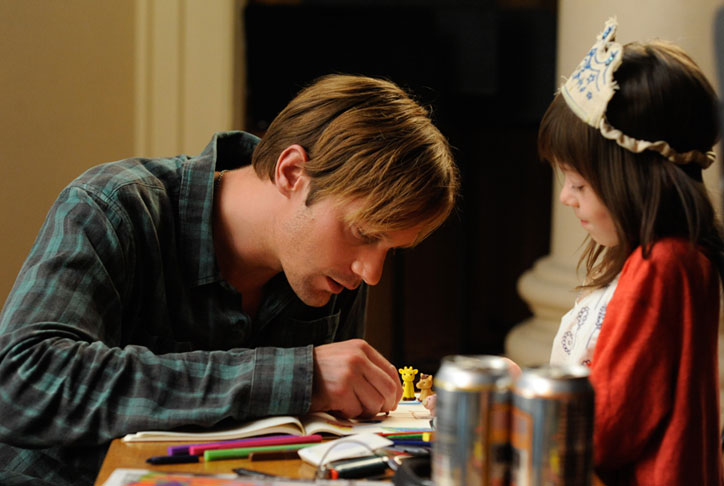
What does a six-year-old girl understand about the tumultuous life of grown-ups? The new film, What Maisie Knew, asks that question. The movie is a gut-churning domestic drama about a turbulent divorce and its collateral damage.
Directed by Scott McGehee and David Siegel and starring Julianne Moore, Steve Coogan, and Alexander Skarsgård, the film is a loose and contemporary adaptation of the Henry James novel.
What Maisie Knew observes Maisie as she observes her parents, who toss and tug her back and forth in a brutal custody battle. Maise is the contested territory, as well as a weapon, a hostage, and a casualty. What Maisie Knew makes Kramer vs. Kramer look like a sunny walk in the park.
Julianne Moore stars as a train wreck of a parent -- a hard-living, past-her-prime rock star. Steve Coogan plays the seemingly stable parent, who appears calmer but is ultimately no less selfish or destructive. They are consumed with themselves; they are incidental parents.
In harm's way is their daughter Maisie, played with an unsettling stoicism by six-year-old actress Onata Aprile. Maisie plays with her plastic farm animals as her parents scream and curse. Maisie wakes to hear the slamming of doors and pounding on doors. In the cutest of tiger ears, she peeks around the corner where her mother and a group of stoners blast music and slouch on the couch. She speaks little but absorbs it all.
Scenes of a boozy Moore wallowing and strung out are interspersed with scenes of Maisie playing cat's-cradle or with her toys. The should-be wholesomeness of childhood is repeatedly smacked against the sordid lives of adults who are part-time parents at best.
From the producers of The Kids are All Right, the film is another sharply-crafted look at the fracturing of a nuclear family and the possibility that outsiders can come into the family sphere.
Nancy Doyne and Carroll Cartwright's screenplay is acutely affecting, painful at times, but it still allows for moments of humor. Susanna's parental instincts can be laughably horrible and Moore is wonderful at delivering these lines on the razor's edge of comedy and tragedy. Her lack of self-awareness and self-control, her pettiness and rock-star petulance are blackly comic, but mostly just despicable. It would be funny if it wasn't going to leave scars.

On their way to the custody hearing, Susanna tries to prime her daughter: "You can definitely tell about the time he threw you on to the couch. Don't you remember? It was your first most shattering moment."
Coogan and Moore's characters play a tug of war with their daughter, lavishing her with goodies, coaxing her to their side, digging for info about each other's new lives. In scenes set in their striking SoHo apartments, we see privileged lives, bedrooms filled with giant stuffed animals, canopy beds, all that money can bribe.
Coogan's disappointingly self-absorbed Beale abruptly marries Maisie's nanny (Joanna Vanderham as the kind, but conflicted Margo). Initially, it seems to inject some stability to their household. So Susanna hastily marries a rumpled bartender (Alexander Skarsgård).
Skarsgård's portrayal of Lincoln is perhaps the most surprising and touching aspect of this saga. Susanna seems to pluck him from her crew of couch dwellers as an arbitrary step-parent. Or babysitter. An afterthought husband and an ill-equipped father figure, Lincoln comes to this role like a slacker who just woke from a nap and was asked to run an errand.

Scott McGehee and David Siegel skillfully maneuver Lincoln's evolution. During a half-hearted attempt to engage with Maisie, the smell of a crayon during a coloring session unlocks Lincoln's nurturing nature. His growing devotion to Maisie is as surprising to him as it is to us.
Maisie attaches to him, as she has attached to Margo. It is heart-clenching how willing Maisie is to adapt to new situations, as long as there's some promise of stability and safety. But even these designated surrogates retreat from the toxicity and negligence of Susanna and Beale.
Still Maisie embraces both her very flawed parents, giving them second and third and fourth chances. It's touching and painful how willing she is to leap into either of her parents' arms, even after they've left her stranded time after time in a careless game of hot potato.
McGehee and Siegel use understated scenes to show small moments of hope; an age-appropriate day at the beach, the listening to shells, a game of monopoly are detoxifying salves. Childhood is made of small moments among big people. What Maisie Knew conveys the precariousness of stability and hints at the promise of resilience.
This article appeared originally on KQED Arts. Photos courtesy of Millennium Entertainment.
